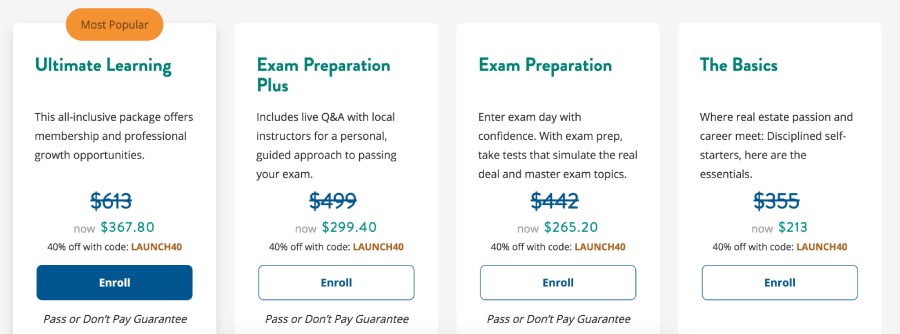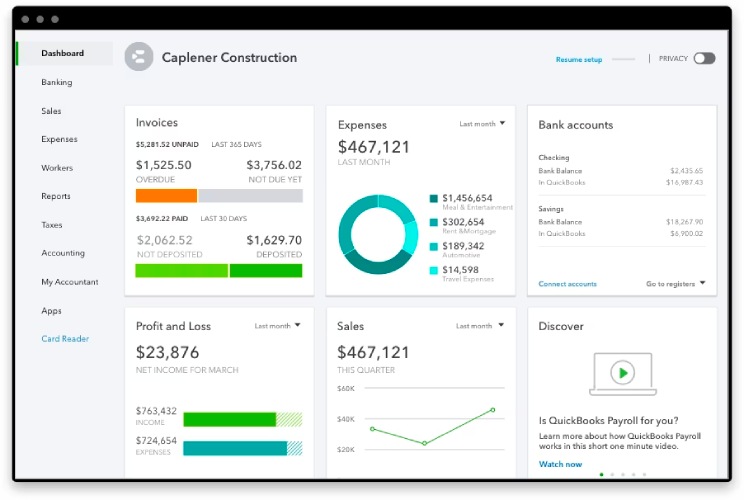Real estate agents and brokers generally operate in a commission-only capacity, and the average real estate broker’s salary fluctuates based on location, market dynamics, and personal business development efforts. In addition to focusing on income opportunities, real estate brokers must consider various expenses that brokers incur that will affect their business revenue. In our analysis of how much real estate brokers make, we’ve looked at the average broker salaries by state and the different factors that affect a broker’s income.
Average Real Estate Broker Salary per State
According to ZipRecruiter, the average broker salary in the United States is $86,356, but can vary between $28,000 and $144,000. The salary of a real estate broker differs significantly from state to state. Real estate brokers in states with booming property markets, like California and New York, can command higher salaries due to higher demand for their services and higher property value. It’s important to note that these figures encompass a wide range of experience levels and specialties within the real estate field.
Click on your state below to see the average broker salary in your state:
Broker Salary per State
Note: Keep in mind that some data is limited, especially with such a vast range of incomes. In addition, averages generally do not accurately reflect the actual income potential, so use this information as a general reference. (Data gathered from ZipRecruiter)
How Real Estate Brokers Earn Money
National and state-level real estate broker salary estimates range widely because of the various types of real estate brokers. For example, associate brokers may operate as real estate agents and generate income through real estate transactions. This means their income is based solely on a commission split with their sponsoring brokerage.
On the other hand, a broker known as a “managing broker,” “broker-owner,” “principal broker,” or a “broker-in-charge” can open their own franchise and supervise hundreds of agents. This workload is much heavier, but the income potential is also much higher. Brokers will be able to dictate the commission splits they share with agents and collect money from each completed transaction. For example, if the commission split is 70/30, the agent will collect 70% of the commission earned and the brokerage will collect 30%.
Here are a few other ways real estate brokers can earn money:
- Referral fees: Referring clients to other real estate agents can help brokers earn referral income.
- Creating your own team: Building a team of agents under your leadership lets you earn a portion of their commissions while providing mentorship and guidance in return.
- Real estate investments: Brokers may invest in properties themselves and earn income from rental income or property appreciation.
- Property management: A broker can offer property management services for rental properties that can generate ongoing income.
- Employee roles at a brokerage: Taking on managerial, administrative, or leadership roles within a real estate brokerage allows licensed real estate brokers to earn a salary or a share of the brokerage’s profits.
- Leasing and rentals: In addition to practicing real estate sales, brokers can earn fees from leasing residential or commercial properties by finding tenants and managing leases.
Real estate brokers can combine several income streams to diversify their earnings within the real estate industry. The time commitments for each opportunity vary, so real estate brokers must assess how to best allocate their time for optimal income results.
To learn more about how commission splits work, read our article on How Real Estate Commission Splits Work (+ Free Calculator).
6 Factors Affecting a Broker’s Salary & Earning Potential
Several factors can impact a real estate broker’s salary. By taking the income data into consideration along with some of the most impactful factors of a broker’s business, you may have a better idea of how much real estate brokers make.
1. Time Management & Commitment
In the initial stages of becoming a real estate agent, time management and commitment play a large role in contributing to their income. However, with experience, brokers can leverage their track record and positive client testimonials to help them attract higher-paying deals.
Real estate agents and brokers operate similarly by dedicating time to prospect for leads, client meetings, property showings, negotiations, and administrative tasks. However, according to the National Association of Realtors (NAR), in 2022, most Realtors worked only 30 hours per week. On the other hand, most brokers dedicate full-time hours to their roles. This is particularly true if they hold principal broker-owner positions within their brokerage.
2. Years of Experience & Reputation
How much a broker makes can be substantially impacted by their track record. An agent’s earnings are notably influenced by their experience in the industry and the reputation they’ve cultivated over time. Given that the median years of experience of all Realtors is approximately 11 years, there are many seasoned brokers who have found long-term success in the industry. Brokers with a history of successful deals and satisfied clients often attract higher-paying opportunities and can withstand the challenges of the ever-changing real estate market.
3. Existing Client Relationships
When existing relationships are nurtured over time, it is beneficial to a real estate professional. Friends and family members may not be ready to buy or sell the moment you become an agent. However, as agents progress in their careers and become brokers, they are able to nurture those initial relationships for business opportunities.
This is especially helpful when looking for listings because 63% of sellers found their agent through referrals or from a previous transaction. Brokers with a strong network of clients, referrals, and industry connections often find themselves in a favorable position because they don’t have to constantly generate leads.
4. Choosing the Right Market Location
The geographical location of a broker’s practice is a major determinant of their real estate broker salary. Booming real estate markets often have a high demand for properties and escalating property values. The combination of these two factors can result in larger commissions for brokers and provide for an easier time generating leads.
The average commission percentage across the United States is 5.37% of the total property sale. This rate is split between the buyer’s agent, the seller’s agent, and each agent’s respective broker. So, if you’re in an area where the average home is $700,000 compared to $250,000, then the 2.72% will yield an agent and their broker more commission earnings.
5. Defining Your Real Estate Niche
Specializing in a specific niche, like luxury properties, commercial real estate, or a particular neighborhood, allows brokers to position themselves as experts in that market. This expertise enhances their reputation and attracts clients seeking specialized knowledge and tailored services.
Brokers who establish a strong presence within a niche can establish unique positioning among their competitors. This niche not only serves as a lead generation tool but also grants brokers a competitive edge in recruiting agents for their teams. Agents who share an interest in their specialized practice or possess expertise aligned with their chosen niche are more likely to choose your team over others.

Online course benefits (Source: The CE Shop)
To help brokers increase their tenure in the real estate industry, continuing education is necessary. The CE Shop not only aims to propel a broker’s career trajectory but also equips brokers with the education they need to carve out their distinctive market niche. Its wide range of courses is tailored to help brokers understand emerging trends, and regulations, and obtain advanced skills.
6. Choice of Broker Role
Licensed real estate brokers have the flexibility to assume a range of roles. The decision to work independently in your own brokerage or align with a real estate agency has financial implications. Independent brokers have the potential for higher earnings due to a greater share of commissions, but they must also manage their business expenses. Agency-affiliated brokers may earn slightly lower commissions, but the agency typically covers certain operational costs.
Common Real Estate Broker Expenses
When you’re reading about real estate brokers’ salaries and items that affect your earning potential, it can be easy to focus on the exciting real estate broker salary potential. However, it’s important to remember that there are additional costs to consider during the process of getting your broker’s license and beyond.
Expenses for Obtaining & Sustaining a Real Estate Broker License
Obtaining and maintaining a real estate broker license comes with some financial considerations. Initial expenses include licensing course fees and examination costs. However, ongoing expenditures involve license renewal fees and continuing education courses to ensure brokers stay compliant with state regulatory requirements.
Fees to consider when launching your real estate career (approximations that vary per state):
- Licensing fees: Brokers are required to hold a valid real estate license, which involves initial licensing fees and ongoing renewal costs. Initial licensing fees can range from $150 to over $1,000.
- Membership dues: Membership in professional real estate associations like the NAR have annual dues of approximately $150 per member for access to resources, networking, and educational opportunities.
- Insurance: Brokers typically need professional liability insurance to protect themselves from potential legal claims related to their services. The monthly fee is approximately $500 to $1,000.
- Marketing and advertising: Expenses related to marketing materials, online advertising, signage, and promotional efforts to attract clients and showcase properties. Annual costs of marketing usually exceed $1,000.
- Transportation: Vehicles used for property showings and client meetings will incur expenses for fuel and vehicle maintenance. This is typically the largest expense for most brokers at about $1,400 annually.
- Continuing education: Brokers are required to complete continuing education courses to maintain their license at an accredited school, which will include course fees. Individual and packaged courses range from $50 to $450.
- Professional development: Costs associated with attending seminars, workshops, and conferences to stay updated on industry trends and enhance skills. These elective courses start at $20.

Multiple course packages (Source: Colibri Real Estate)
Real estate courses are offered through Colibri Real Estate. The school has a cutting-edge learning platform that allows students to choose the course format that best fits their learning needs. Whether you prefer self-paced online courses, live virtual classes, or in-person instruction, Colibri Real Estate provides a flexible educational experience. It also offers multiple course packages to ensure students can find the ideal program to advance their real estate careers and fit their financial needs.
Visit Colibri Real Estate – Use Promo Code: FSB30 for 30% off
Expenses of Brokers Joining a Real Estate Brokerage
When brokers decide to join a real estate brokerage, various costs are required that affect the associate broker’s salary. These fees are collected to help cover expenses for the office space, administrative team members, and marketing efforts. Agents might also incur expenses related to membership dues for affiliations with larger real estate networks, along with training and agent support costs.
Additional fees to consider for brokers joining a brokerage:
- Desk fees or franchise fees: Some brokers work under the umbrella of a real estate brokerage or franchise that may charge desk fees or a portion of commissions in exchange for services and brand recognition. Desk fees can range by brokerage from $50 to $2,500 per month.
- Lead generation costs: Agents might contribute to the cost of lead generation tools or platforms. Managing brokers can include this as part of the commission splits or have you cover a portion of the lead platform, which can start at $20 per month.
- Transaction fees: Most brokerages charge a fee for each completed transaction to cover administrative and processing costs. Transaction fees can start at around $60 per transaction.
- Technology fees: Brokers may be required to contribute to technology expenses for customer relationship management (CRM) systems, website maintenance, and online marketing tools. Some brokerages can charge between $50 and $250 a month for technology tools.
Cost of Starting Your Own Brokerage
Embarking on the journey of starting your own real estate brokerage involves a larger financial investment. The costs associated with this endeavor can vary based on factors such as location, size of the office, number of staff members, and business model.
It’s important for brokers to understand how much does a brokerage make to help determine how much the managing broker will make. Beyond the initial legal and registration expenses, there are costs related to office setup, technology infrastructure, branding, and marketing. Brokers must obtain insurance as well as hire and train salaried staff, which may take up a large amount of your startup budget.
Other expenses to consider when starting your own brokerage:
- Office space: This includes the cost of leasing or renting office space and the rent and utilities associated with the space.
- Technology tools: Investments in software, websites, CRM systems, and other technology tools are essential for managing client relationships, listings, and transactions.
- Administrative costs: Costs associated with administrative support staff, office supplies, and other operational needs.
- Legal and accounting services: Fees for legal advice and accounting services to ensure compliance with real estate regulations and manage finances.
- MLS and listing services: Membership fees for access to Multiple Listing Services (MLS) and online listing platforms to promote the brokerage’s properties.

Business financial dashboard (Source: QuickBooks)
It’s important for real estate brokers to carefully track their expenses to manage their budget effectively and ensure that their business remains profitable. By meticulously recording each expenditure, brokers can gain a clear understanding of their financial position and identify areas for potential cost optimization. QuickBooks is a financial management solution that empowers real estate professionals to take control of their finances. From tracking income and expenses to generating reports, QuickBooks simplifies accounting tasks for brokers and agents with its user-friendly interface.
Frequently Asked Questions (FAQs)
Real estate broker salaries are not generally public knowledge. Although we can find who did the highest sales volume, it doesn’t state their expenses, fees, and splits for their team. However, in 2022, the Eklund-Gomes team ranked first for residential re-sales with $291 million in volume. The team also ranked fourth for new-inventory sales, with approximately $332 million in sales.
A real estate broker’s salary is predominantly earned through commissions, which are a percentage of the sale price of a property. Brokers facilitate transactions between buyers and sellers and receive a portion of the commission from each completed deal. Their income is directly tied to their ability to close successful transactions, so agents don’t receive a set rate for their time, unlike general salaried positions paid for a set number of weekly hours.
Real estate brokers in New York can earn substantial incomes due to the local real estate market. The earnings of brokers in NY are influenced by the state’s property values and high demand for real estate services. On average, real estate brokers in New York City can make approximately $103,669 per year, according to Indeed. However, top-performing brokers specializing in high-end properties and possessing a strong clientele can significantly exceed these figures.
Bottom Line
The real estate broker’s salary is influenced by an array of factors. The average earnings across different states reveal that regional market dynamics are one of the key factors to help you determine your earning potential. In addition to focusing on the ways a real estate broker can earn income, it’s necessary to consider the expenses required for the role. Balancing earnings and expenditures in this profession will help you succeed long term in the real estate industry.